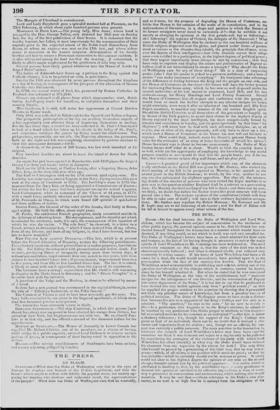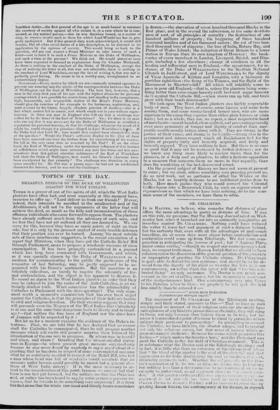THE DUEL.
GLOBE-011 the duel between the Duke of Wellington and Lord Win- chilsea, which has become the subject of conversation to the exclusion of ether public topics, the general opinion seems to he, that his Grace has con- ducted himself throughout the transaction in a manner which would have re. deemed, it' any thing could, an act which in itself, was rash and uncalled for. The Duke of Wellington's letters have been as much admired for their style and temper, as the fact of his having, thought it necessary to notice the angry epistle of Lord Winchilsea to Mr. Coleridge has been wondered at. The most conclusive comment on this step is, that the story of the duel was at first almost universally -believed ; and when it obtained credit, seas referred very commonly to wrier causes. .1f the letter of Lord Winchilsea had been a fit cause for a duel, the world would immediately have pitched upon it as the provocation when the fact of the ineetiug was known. That the Earl of Winchilsea acted unwarrantably in publishing such a leder, setting out of the question the-absurdity of the charges which it contains, cannot be denied, since he has himself admitted it. But when lie stated that he was convinced the Duke of Wellington, at the time of the establishment, had " insidious designs for the infringement of our liberties, and the introduction of Popery into every department of the State," it is but fair to say that he professed to have derived thus very foolish opinion only from " political events ;" so that he supplied due proper antidote to his assertion by showing that it proceeded not froin any peculiar means of knowledge, but from a peculiar exec:As of political irritation. The Duke of Wellington seems to have made a distinc- tion between his acts as a supporter of the King's College and his acts as a minister. "The question," he says in his note. " for IIIC 1101ii to decide is this—Is a amitleman, who happens to be the King's minister, to submit to be itisultede'hy any gentleman who thinks proper to attribute to him disgrace- ful or criminal motives for his conduct as an individual ?"--But this is rather a shadowy difference; for, though his support of the King's -College was gisen as that of an individual, there can be no doubt that it derived a cha- racter and importance from his station ; and, though not an official, his sup- port was certainly a public measure. The main question in the transaction is, whatever the demerit of Lord Winchilsea's letter may have been (and for ourselves we think it was indecent and unjust to a degree only to be palliated by considering the contagion of the violence of the party with which Lord Winchilsea has allied himself,) in what way the Duke would have relieved his character from any aspersion by the course he took ? The only thing which could be proved by a proceeding of this kind was, that lie was coura- geous—which, of all others, is the position which needs no proof; or that he was irritable—which he certainly should not be anxious to prove. It surely could not alter in the slightest degree the opinion of any man on the absurd charges brought against him by his political oppeneies. 'ihe utility which is attributed to duelling is, that, by the established riga ,,f every geatleinan to demand this species of satisfaction for offeosive ;intimations, a tone of cour- tesy is preserved in conversation and controveraiea, which nothing. else would maintain. It may be said that—without reference to the Duke's own cha- racter, as no man is so high that he is exempt front the obligation of the
,
humblest duties--the first general of the age is as much bound to maintain the courtesy of society against all who violate it, in a case where he is con- cerned, as any untried person,—,that he was therefore bound, as a matter of duty, to 'Yves:: insults such as those for which Lord Winchilsea has so pro- perly apologized. But if this general duty were acknowledged, it would still remain, like all other social duties of a like description, to be directed in its application by the opinion of society. This would bring us back to the question, did any one expect a Prime Minister to take notice of such a letter—not to limit it to such a Prime Minister as the Duke of Wellington, and such a time as the present ? We think not. He would almost as soon have been expected to demand an explanation from Sir Charles Wetherell. As there is nothing in the conduct of the Duke of Wellington, except the step of noticing the letter at all, that was not admirable, there is nothing in the conduct of Lord Winchilsea, except the fact of writing it, that was not in perfectly good feeling. He seems to be a worthy man, wrongheaded to an extraordinary degree. STANDARD—Every motive by which we are commonly actuated operates to prevent our entering into the merits of the correspondence between the Duke of Wellington and the Earl of Winchilsea. The bare fact, however, that a man in the sixty-first year of his age, with the highest character for personal cou rage which it was possible for man to have, and standing in the conspicuous, high, honourable, and responsible station of the King's Prime Minister, should give the sanction of his example to the barbarous, unchristian, and, until revived by his Grace, happily obsolete practice of duelling—this is a fact which cannot fail to amaze, and which ought not to pass without repre- hension. Is there any man in England who will say that a challenge was called for by the letter of the Earl of Winchilsea? No; for there is no man Ito can say that it was necessary fur the Duke of Wellington to establish a reputation for personal bravery, or that his challenge, whatever the result of it might be, could change the premises alleged in Lord Winchilsea's icier. If the Duke had shot Lord W., how would that exploit have changed tile state of the question ? Would the Duke's orthodox display on the 21st of June have been removed one hour the further from his engendering of his execra- ble bill at the very same date as asserted by Mr. Peel ? lf, on the other hand, the Earl of Winchilsea, under the momentary influence of that instinct of self-defence which might have actuated any man less brave and less con- scientious than that gallant christian nobleman—if the Earl of Winchilsea had slain the Duke of Wellington, how would his Grace's character have been exculpated by that calamity ? The challenge was therefore in every sense uncalled for. Mr. Pitt was a young man—he had not all established character for bravery, and he was not the challenger.



















 Previous page
Previous page